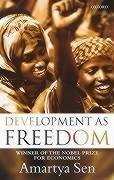Helpful Score: 1
Basic premise: GDP and other income measures, especially broad macro-level income measures, are not the proper way to measure development. Development should be measured in the ability of people to lead the lives they choose. They must therefore HAVE choice. Political freedoms are not a "nice" addition to development, nor are they possibly detrimental to development, they are part of development. The ability to have public discussions on topics is needed to allow people to know their choices and influence their own lives. Fasting is a choice--IF you have enough to eat. Otherwise it is starvation.
My only complaint is in answering the "Asian tradition" he draws on almost entirely Indian-based sources, which I find annoying since when someone talks about the Asian tradition in the way he is, India is NOT included in the concept--I would rather he have used more from the countries he was quoting leaders using that justification--or he needed evidence of someone applying it to India. I think his points are valid and there is similar traditions in the "Asian values" countries, but he should have found them and not relied on India being part of Asia...because it isn't in this case. That chapter really bugged me. The rest of the book, however, more than makes up for it.
One early and interesting discussion was on different ways of measuring happiness. How you decide someone is most "worthy" of a job when job skills are all equal was interesting. Is it the person who would have the most impact on their life? The one not used to being poor? The least happy? It all depends on what information is considered when making the decision--what is the information base, outside of which everything is considered irrelevant. Every theory has an underlying information base-a lot of them are simply not obvious. Income only doesn't take into account if someone is particularly sick they need more income to be at the same "utility" level, for example.
This is not an easy book. It is written assuming the reader is not an economist but is educated and intelligent. The chapters are based on seminars to the world bank staff, so this makes sense. It also means it is dense, but clear.
I am quite impressed with the ideas presented in this book and this is staying on my shelf. Worth the effort to get through the entire thing.
My only complaint is in answering the "Asian tradition" he draws on almost entirely Indian-based sources, which I find annoying since when someone talks about the Asian tradition in the way he is, India is NOT included in the concept--I would rather he have used more from the countries he was quoting leaders using that justification--or he needed evidence of someone applying it to India. I think his points are valid and there is similar traditions in the "Asian values" countries, but he should have found them and not relied on India being part of Asia...because it isn't in this case. That chapter really bugged me. The rest of the book, however, more than makes up for it.
One early and interesting discussion was on different ways of measuring happiness. How you decide someone is most "worthy" of a job when job skills are all equal was interesting. Is it the person who would have the most impact on their life? The one not used to being poor? The least happy? It all depends on what information is considered when making the decision--what is the information base, outside of which everything is considered irrelevant. Every theory has an underlying information base-a lot of them are simply not obvious. Income only doesn't take into account if someone is particularly sick they need more income to be at the same "utility" level, for example.
This is not an easy book. It is written assuming the reader is not an economist but is educated and intelligent. The chapters are based on seminars to the world bank staff, so this makes sense. It also means it is dense, but clear.
I am quite impressed with the ideas presented in this book and this is staying on my shelf. Worth the effort to get through the entire thing.




